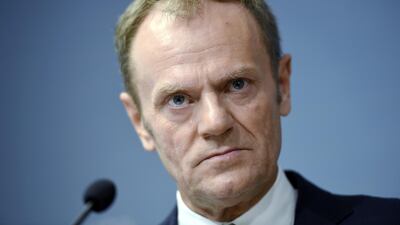EU President Donald Tusk sought to play down the impact of potential US tariffs on steel and aluminium imports as Europe braces for more conflict with President Donald Trump.
Even if the EU doesn’t manage to secure an exemption from Mr Trump’s tariffs, the impact will only affect about 1.5 per cent of trans-Atlantic trade, Mr Tusk said in a letter to the European Union’s 28 leaders, who meet in Brussels on Thursday. By comparison, the US decision to raise tariffs in the 1930s “applied to one third of our trade” and “led to a global trade war”, he said.
Trade is adding to a series of disagreements between the EU and the US - from climate action to Iran’s nuclear accord - that are testing the bonds between the planet’s biggest economies. German Chancellor Angela Merkel suggested last year that Europe can’t take American support for granted, after Mr Trump failed to reaffirm the US’ security commitment.
_______________
Read more:
UAE seeks exemption from US steel and aluminium tariffs
Exclusive: Total chief believes shale and US tariffs may impact oil prices more than weaker dollar
_______________
EU leaders plan to discuss their response in the trade dispute on Thursday. The summit statement’s language on tariffs was left blank in a draft seen by Bloomberg, pending a last-ditch effort to secure a waiver.
In his letter, Mr Tusk said while the bloc has no choice but to retaliate, it should not lose sight of the “broader perspective” and must continue to engage with the US.
“Transatlantic relations are a cornerstone of the security and prosperity of both the United States and the European Union,” Mr Tusk said.
Renewed tensions with the US come as the bloc mulls what to do about the poisoning of a former spy in Britain, which the UK blames on Russia. EU leaders pledge to “coordinate on the consequences to be drawn in the light of the answers provided by the Russian authorities,” according to the draft statement.
Mr Tusk, who chairs the meetings of EU leaders, didn’t congratulate Vladimir Putin on his re-election this week. By contrast, European Commission head Jean-Claude Juncker sent a warmly-worded letter saying that “positive relations between the European Union and the Russian Federation are crucial to the security of our continent.”
“Our common objective should be to re-establish a cooperative pan-European security order,” said Mr Juncker, who leads the EU’s executive arm.

